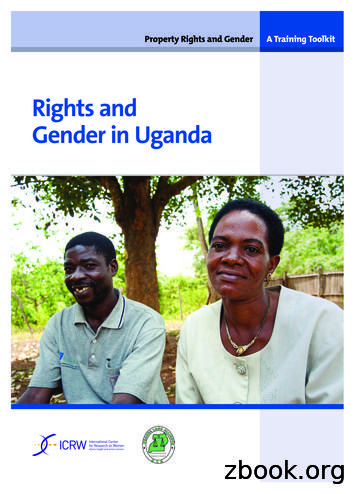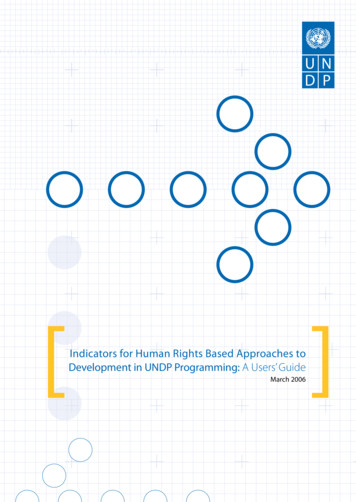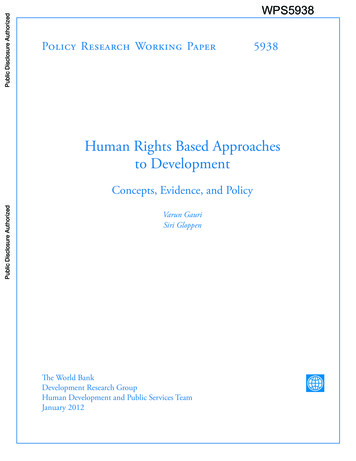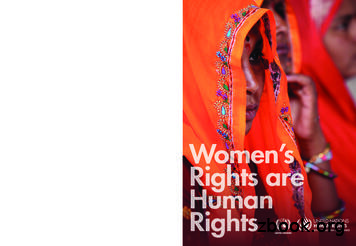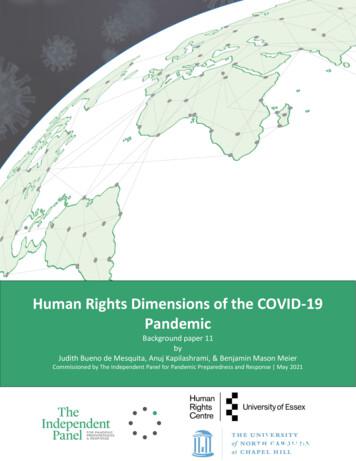A Human Rights-based Approach For Health And Social Care Services - HIQA
A Human Rights-basedApproach for Health andSocial Care ServicesHealth Information and StandardsDirectorate, HIQA
IntroductionWhat is the purpose of this slide deck?This slide deck has been developed by the Health Information andQuality Authority (HIQA) to provide a teaching resource on a humanrights-based approach to care and support in health and social careservices.Who is this slide deck for?This slide deck will be useful for those teaching health and social carestudents and those providing training for health and social care staff.
IntroductionHow can this slide deck be used?The slide deck has been designed to be used in a flexible way.Content has been divided into different sections and these can bedelivered together or separately as individual modules.These slides may be adapted for teaching and training purposes.We ask that you acknowledge HIQA as the source of these materials.
IntroductionAbout the GuidanceThe Guidance on a Human Rights-based Approach in Health and SocialCare Services was developed in conjunction with Safeguarding Ireland,and was part-funded by a grant from the Irish Human Rights andEquality Commission (IHREC).Safeguarding Ireland is a national body tasked with promotingsafeguarding of vulnerable adults to protect them from abuse.IHREC is Ireland’s national human rights and equality institution. Itspurpose is to protect and promote human rights and equality inIreland.
IntroductionThe Guidance is available todownload here from the HIQAwebsite (www.hiqa.ie).
Contents of the Slide deckSection 1: About the Health Information and Quality Authority (Slides 7 – 12)Section 2: Introduction to human rights (Slides 13 – 18)Section 3: Human rights in an international context (Slides 19 – 24)Section 4: Human rights in an Irish context (Slides 25 – 39)Section 5: Human rights in health and social care settings (Slides 40 – 58)Section 6: A human rights-based approach (FREDA Principles) (Slides 59 – 122)Section 7: Case studies, practical exercise and useful resources (Slides 123 – 137)
Section 1:About the Health Information andQuality Authority (HIQA)
The Health Information and Quality AuthorityHIQA is an independent statutory authority, established in 2007,to improve the safety and quality of health and social careservices for the public.
HIQA’s functions:Standards & QualityDeveloping person-centred standards and guidance forhealth and social care services.RegulationRegulating residential services for older people, peoplewith a disability and children’s special care units, as well asmedical exposure to ionising radiation (for example, Xrays).MonitoringMonitoring the quality and safety of health services andchildren’s social services.
HIQA’s functions:Health Technology AssessmentEvaluating the clinical and cost-effectiveness of healthprogrammes, policies, medicines, medical equipment, diagnosticand surgical techniques, and health promotion and protectionactivities.Health InformationDeveloping a consistent and standardised approach to healthand social care information including in National DataCollections and eHealth services in Ireland.National Care Experience SurveyCarrying out service-user experience surveys, including theNational Inpatient Experience Survey and the NationalMaternity Experience Survey.
Standards and guidance developmentUnder the Health Act, 2007 HIQA: Sets standards for the safety and quality of health and social careservices Promotes safety and quality in the provision of health and socialservices for the benefit of the health and welfare of the public
Purpose of national standards and guidanceNational standards A key driver in quality and safety Act as an impetus to recognise good practice and address poorperformanceGuidance Help staff to implement national standards, or as a guide tomaking improvements in a particular area
Section 2:Introduction to human rights
Human rightsWhat are human rights?Human rights are the basic rights and freedoms that all peopleshould enjoy, regardless of nationality, place of residence, gender,national or ethnic origin, colour, religion, language or any other statusor characteristic.Who has human rights?We are all born with human rights regardless of who we are, wherewe are from or any other status or characteristics.
Categories of human rightsAbsolute rights cannot be restricted in any circumstance, includinga national emergency (for example, the right to freedom fromtorture).Qualified rights can be restricted in certain circumstances if theinterference is justified. The restriction must be in the interest of thewider community or to protect other people’s rights (for example,protection of health and prevention of crime).Limited rights can only be restricted in specific situations set out inlaw (for example, being arrested for committing a crime).
History of human rightsUniversal Declaration of Human Rights(UDHR) 1948 Milestone document in history of humanrights Established fundamental human rights to beuniversally protected Expression of values and agreed-uponstandards but Declaration is not legallybinding UDHR was a precursor to the EuropeanConvention on Human Rights (ECHR).
History of human rights continuedEuropean Convention on Human Rights(ECHR) ECHR is the basis of the European humanrights system, drafted by the Council ofEurope in 1950, post Second World War First regional treaty designed to protecthuman rights, democracy and the rule of law ECHR’s main purpose is to limit a state’sinterference with the rights of citizens Enforced by the European Court of HumanRights.
Human rights defined under ECHR:Article 1: Obligation to respect Human RightsArticle 8: Right to respect for private andfamily lifeArticle 2: Right to lifeArticle 9: Freedom of thought, conscience andreligionArticle 3: Prohibition of tortureArticle 10: Freedom of expressionArticle 4: Prohibition of slavery and forcedlabourArticle 11: Freedom of assembly andassociationArticle 5: Right to liberty and securityArticle 12: Right to marryArticle 6: Right to a fair trialArticle 13: Right to an effective remedyArticle 7: No punishment without lawArticle 14: Prohibition of discrimination
Section 3:Human rights in aninternational context
Core international human rights instrumentsHuman rights instrumentMonitoringbodyDate established1. Convention on the Elimination of AllForms of Racial DiscriminationCERD21 December 19652. International Covenant on Civil andPolitical RightsCCPR16 December 19663. International Covenant on Economic,Social, and Cultural RightsCESCR16 December 19664. Convention on the Elimination of AllForms of Discrimination Against WomenCEDAW18 December 19795. Convention against Torture and OtherCATCruel, Inhuman or Degrading Treatment orPunishment10 December 1984
Core international human rights instrumentsHuman rights instrumentMonitoringbodyDate established6. Convention on the Rights of the ChildCRC20 November 19897. International Convention on theProtection of the Rights of All MigrantWorkers and Members of Their FamiliesCMW18 December 19908. International Convention for theProtection of All Persons from EnforcedDisappearanceCPED20 December 20069. Convention on the Rights of Personswith DisabilitiesCRPD13 December 2006Further information available ages/CoreInstruments.aspx
Charter of Fundamental Rights ofthe European Union 2000The Charter of Fundamental Rights of the European Union includes all personal,civic, political, economic, and social rights enjoyed by people within the EU in onedocument. It covers: The rights found in the case law of the Court of Justice of the EU The rights and freedoms enshrined in the ECHR Other rights and principles deriving from the constitutions of EU countries.Within the charter, rights and freedoms are included under 6 titles:1. Dignity2. Freedoms3. Equality4. Solidarity5. Citizen’s rights6. JusticeFurther information available at:http://www.europarl.europa.eu/charter/pdf/text en.pdf
European Charter of Patients’ Rights 2002 The European Charter of Patients’ Rights (2002) aims to guarantee a highlevel of human health protection and to assure the high quality of servicesprovided by different European health services The charter is aligned with the duties and responsibilities that both serviceproviders and people using services must assume Charter applies to all individuals but acknowledges that certain characteristicsmay influence individual health care needs (for example, age, gender,religion, socio-economic status) Charter is considered a guide for good practice but it is not legally binding.Further information available at:https://ec.europa.eu/health/ph overview/co operation/mobility/docs/health services co108 en.pdf
International human rightscomplaints proceduresIndividualcommunicationsCommittees of experts (treaty bodies) monitorimplementation of treaty provisions by State partiesand may consider complaints from individuals.State-to-statecomplaintsSeveral human rights treaties allow for State parties tocomplain about alleged violations of the treaty byanother State party.InquiriesCommittees may initiate inquiries if they have receivedreliable information about serious violations of theconventions in a State party.Further titions/Pages/HRTBPetitions.aspx
Section 4:Human rights in an Irish context
Human rights in IrelandWhat do you think when you hear the term ‘human rightsand equality’?Equality for all/everyone treated equally13%23%Equal rights for travellers/ethnic minorities/other nationalities/race9%Gender equalityAll ages treated the same10%15%Right to shelter/homeless crisis16%14%LGBT rightsOtherAmárach Survey, 2018. Understanding and Awareness of Human Rights and Equalityin Ireland. (Survey carried out on behalf of IHREC) (n 1,200)
Irish legal frameworkThe Irish Constitution (1937) sets out how Ireland should begoverned and the rights of Irish citizens. The Constitution can only bechanged by public referendum. Fundamental rights set out in theConstitution include: right to life equality before the law right to a fair trial right to liberty right to freedom of expression, assembly, and association protection of the family.Further information available at:http://www.irishstatutebook.ie/pdf/en.cons.pdf
Irish legal framework continuedThe Mental Health Act, 2001 addresses two main requirements inthe provision of mental health care: establishment of a legislative framework within which individuals witha mental health disorder may be admitted, detained and treatedinvoluntarily in approved centres promotion and maintenance of quality standards of care andtreatment that are regularly inspected and regulated.The Act improves protection of the right to liberty among individualswith mental disorders and increases Ireland’s adherence to internationalhuman rights standards in areas of concern (involuntary admission andtreatment).Further information available enacted/en/pdf
Irish legal framework continuedThe European Convention on Human Rights (ECHR) Act (2003)protects the following rights in Ireland: Right to life (Article 2) Prohibition of torture (Article 3) Right to liberty and security (Article 5) Right to a fair trial (Article 6) Right to respect for private and family life (Article 8) Freedom of thought, conscience, and religion (Articles 9) Freedom of expression (Article 10) Prohibition of discrimination (Article 14) Protection of property (Article 1)Further information available enacted/en/pdf
Irish legal framework continuedThe UN Convention on the Rights of Persons with Disabilities(UNCRPD) (2006) aims to promote, protect, and ensure the full andequal enjoyment of human rights and fundamental freedoms by allpersons with disabilities.The UNCRPD was ratified in Ireland in March 2018 and is aligned to abroader human rights agenda, for example: equal recognition before the lawaccess to justice for people with disabilitiesfreedom of expression and opinionaccess to information, work and employmentparticipation in political and public life.Further information available tion/convoptprot-e.pdf
Irish legal framework continuedHIQA was established under the Health Act 2007 to reform theregulation of health and social care services and set national standardsfor health and social care services.Under the Health Act, HIQA registers designated centres. Registeredproviders are required to: notify HIQA of any adverse events, including allegations of abuse orsuspected abuse of residents implement policies and procedures for the prevention, protectionand response to abuse, and report any incidents to HIQA.Further information available enacted/en/pdf
Irish legal framework continuedThe Irish Human Rights and Equality Commission Act 2014 established theIrish Human Rights and Equality Commission (IHREC).IHREC aims to create an inclusive society where human rights and equality arerespected, protected and fulfilled for everyone, everywhere.The IHREC Act 2014 sets out IHRECs functions as follows: protect and promote human rights and equality and their understanding encourage a culture of respect for human rights, equality, and interculturalunderstanding promote understanding of the importance of human rights and equality promote tolerance and acceptance of diversity and respect for freedom anddignity work towards the elimination of human rights abuses, discrimination andprohibited conductFurther information available enacted/en/pdf
Irish legal framework continuedThe Public Sector Equality and Human Rights Duty 2014 is setout in Section 42 of the IHREC Act 2014 and places a legal obligation onpublic bodies (including health and social care services) to: eliminate discrimination promote equality of opportunity protect the human rights of people using services and staff in theirday-to-day duties.The Duty ensures that equality and human rights are an integral part ofhow a public body fulfils its purpose and delivers on its strategic plan.
Three-step process ofimplementing the PublicSector Equality andHuman Rights Duty:1. Assess2. Address3. ReportFull report available at:https://www.ihrec.ie/app/uploads/2019/03/IHREC PublicSector Duty Final Eng WEB.pdf
Irish legal framework continuedThe Equal Status Acts 2000-2015 outline the following ten grounds ofdiscrimination: age civil status disability family status gender receiving social welfare payments membership of Travellercommunity race, colour or nationality religion sexual orientationThe Acts prohibit discrimination in access to and use of goods and services,including indirect discrimination and discrimination by association, sexualharassment and harassment, and victimisation.Further information available nacted/en/pdf
DiscriminationDirect discrimination happens when a person is treated lessfavourably than another person in the same situation under any of thegrounds covered by legislation.Discrimination by association can occur when a person is treatedless favourably simply because they are associated with or areconnected to another person.Indirect discrimination happens when someone is treated in thesame way as others without taking into account that person’s differentsituation. The individual is placed at a disadvantage as a result ofblanket policies, conditions or rules which they might find hard tosatisfy as a result.
Irish legal framework continuedThe Assisted Decision-Making (Capacity) Act 2015 supports decision-making byadults whose capacity is in question or may shortly be in question by enabling themto: enter into legally binding arrangements to be supported in making decisions abouttheir personal welfare, property and affairs plan in advance (enduring power of attorney and advance healthcare directives).A person is determined to lack capacity to make a particular decision if they are unableto: understand information relevant to the decision retain that information long enough to make a voluntary choice use or weigh that information as part of the process of making the decision communicate their decision (that is, by talking, writing, signing, assistivetechnology or any other means).Further information available enacted/en/pdf
Human Rights Law in Ireland In Ireland, national courts are responsible for determining allegations ofhuman rights violations. Under national law, an individual can only engage the protectionsafforded under an international human rights law if it has beenincorporated into national law. For example, the rights protected underthe Irish Constitution, the ECHR Act 2003 and the EU Charter ofFundamental Rights 2012 (where EU law is applicable). In instances where there is a lack of incorporation, individuals can makea complaint to a regional or international human rights body, such asthe European Court of Human Rights.
Legal frameworkThe legal framework is availableto download here from theHIQA website.
Section 5:Human rights in health and social caresettings
The Irish Constitution: Key human rightsarticles for health and social careRights relevant to health and social care: Right to a fair trial (Article 38.1) Right to life (Article 40) Right to be held equal before the law (Article 40.1) Freedom from torture and ill-treatment (Article 40.3) Right to personal liberty (Article 40.4.1º) Freedom of expression (Article 40.6.1º) Right to the private ownership of external goods (Article43.1.1º) Right to freedom of conscience and the free professionand practice of religion (Article 44.2.1)Unenumerated rights relevant to health and socialcare: Right to privacy (Article 40.3) Right to bodily integrity (Article 40.3)
ECHR: Key human rights articles forhealth and social careProtection ofproperty(Article 1,Protocol 1)Prohibition ofdiscrimination(Article 14)Freedom ofexpression(Article 10)Right to life(Article 2)Prohibition oftorture(Article 3)Right toliberty andsecurity(Article 5)Health andSocial CareSettingsRight to afair trial(Article 6)Freedom ofthought,conscience andreligion (Article 9)Right torespect forprivate andfamily life(Article 8)
UNCRPD: Key human rights articles forhealth and social careEquality andnondiscrimination(Article 5)Generalprinciples(Article 3)Health(Article 25)Respect forhome andthe family(Article 23)Freedom ofexpression andopinion, and accessto information(Article 21)Right to life(Article 10)Equalrecognitionbefore the law(Article 12)Access tojustice(Article 13)Liberty andsecurity ofthe person(Article 14)Respect forprivacy(Article 22)Living independentlyand being included inthe community (Article19)Freedom fromtorture or cruel,inhuman ordegradingtreatment orpunishment(Article 15)Protecting theintegrity of theperson (Article17)Freedom fromexploitation,violence andabuse (Article 16)
Key human rights articles for healthand social care - definitionArticle 2 of ECHRRight to lifeArticle 10 of UNCRPDArticle 40 of the IrishConstitutionHow might this arise in a health or social care setting? For example, when a person’s life may be at risk and decisions arebeing made to withdraw life-sustaining treatments or not toresuscitate a person. For example, when a person is experiencing suicidal thoughts.
Key human rights articles for healthand social care - definitionArticle 3 of ECHRProhibition oftortureArticles 15 & 16 ofUNCRPDArticle 40.3 of the IrishConstitutionHow might this arise in a health or social care setting? For example, when someone receives continuing treatment/care thatcauses serious harm, suffering or humiliation. For example, when a person’s need for pain relief is not assessed orresponded to.
Key human rights articles for healthand social care - definitionArticle 5 of ECHRRight to libertyand securityArticle 14 of UNCRPDArticle 40.4.1º of the IrishConstitutionHow might this arise in a health or social care setting? For example, having blanket policies, conditions or rules in place inresidential centres can negatively impact the liberty of people usingthe service. For example, when the use of a restrictive practice such as physicalrestraint is being considered.
Key human rights articles for healthand social care - definitionRight to a fair trialand access tojusticeArticle 6 of ECHRArticle 13 of UNCRPDArticle 38.1 of the IrishConstitutionHow might this arise in a health or social care setting? For example, a person using services should be facilitated in accessinglegal representation and or independent advocacy representation. For example, when a person wishes to make a complaint about aservice.
Key human rights articles for healthand social care - definitionArticle 8 of ECHRRight to respect forprivate and familylifeArticles 19, 22 & 23 ofUNCRPDArticle 40.3 of the IrishConstitutionHow might this arise in a health or social care setting? For example, people using services should be supported in decidinghow they wish to live and whether or not to have intimate relationshipsand to marry. For example, when people are supported to participate in communitylife and to maintain and improve their health and wellbeing.
Key human rights articles for healthand social care - definitionFreedom of thought,conscience andreligionArticle 9 of ECHRArticle 3 of UNCRPDArticle 44.2.1º of the IrishConstitutionHow might this arise in a health or social care setting? For example, the values and beliefs of the person are consideredwhen providing them with information about the risks and benefits ofdifferent treatment options. For example, services are tailored so that they are culturally sensitivefor people using them.
Key human rights articles for healthand social care - definitionArticle 10 of ECHRFreedom ofexpressionArticle 21 of UNCRPDArticle 40.6.1º of theIrish ConstitutionHow might this arise in a health or social care setting? For example, people using services should be supported andfacilitated to express their wishes for their care and support. For example, the person’s wishes are adhered to in relation to whatinformation is shared with their family.
Key human rights articles for healthand social care - definitionArticle 14 of ECHRProhibition ofdiscriminationArticles 3, 5, 17 and 25of UNCRPDArticle 40.1 of the IrishConstitutionHow might this arise in a health or social care setting? For example, if someone is treated differently to others under comparablecircumstances on account of their characteristics (for example, on accountof their age or sex).For example, if people with different characteristics (for example, differentcommunication abilities) are treated the same, which can lead to unequaloutcomes.
Key human rights articles for healthand social care - definitionRight to protectionof propertyArticle 1 of Protocol 1 ofECHRArticle 12 of UNCRPDArticle 43.1.1º of the IrishConstitutionHow might this arise in a health or social care setting? For example, when someone who is accessing treatment orservices is able to access their possessions and property asrequired or requested. For example, when a person living in a residential centre issupported to make decisions for themselves about how tospend their money.
National standards developed by HIQA High-level reference to human rights and a human rights-basedapproach to care and support is made in a number of the nationalstandards developed by HIQA
National Standards for Residential Services forChildren and Adults with Disabilities (2013)
National Standards for Residential CareSettings for Older People in Ireland (2016)
Codes of conduct and ethicsRespect for human rights is implicit in the codes and guides ofconduct and ethics of different health and social care staff. See list ofrelevant codes and guides below: Code of Professional Conduct and Ethics for Registered Nurses andRegistered Midwives (Nursing and Midwifery Board of Ireland, 2014) Guide to Professional Conduct and Ethics for Registered MedicalPractitioners (Medical Council, 2009) Social Workers Registration Board Code of Professional Conduct andEthics (CORU, 2019)
Codes of conduct and ethics continued Codes of Practice for those working in mental health services(Mental Health Commission, 2006) Rules of Professional Conduct Incorporating Code of Ethics andGuidelines for Professional Behaviour from the Irish Society ofChartered Physiotherapists (Irish Society of CharteredPhysiotherapists, 2014) Occupational Therapists Registration Board Code ofProfessional Conduct and Ethics (CORU, 2019) Dental Council Code of Practice relating to ProfessionalBehaviour and Ethical Conduct (Dental Council, 2012)
Linking national standards to human rightsAvailable to download here from the HIQA website
Section 6:A human rights-based approach
Why do health and social care staff need toapply a human rights-based approach? Supports the provision of person-centred careand support Professional obligation It’s the law
FREDA principles It is helpful to focus on theaspects of legislation.underlying core values ofhuman rights (Fairness,Respect, Equality, Dignity,Autonomy) rather than on thetechnical Useful to think of human rightsin the day-to-day work ofhealth and social care serviceswithin the context of principles. FREDA principles form thebasics of good care.Reference: Curtice M, Exworthy, T. FREDA: a human rights-basedapproach to healthcare. The Psychiatrist. 2010;34 (150-156).
FREDA principles A human rights-basedapproach to health and socialcare involves all five FREDAprinciples. Principles are interdependentand should inform decisions,not determine them. The weight given to principlesis dependent on thecircumstances underconsideration.
FREDA principlesFairnessFairness means ensuring that when a decision is made with aperson using a service about their care and support, that theperson is at the centre of the decision-making process.RespectRespect is the objective, unbiased consideration and regard forthe rights, values, beliefs and property of other people. Respectapplies to the person as well as their value systems.EqualityEquality means people having equal opportunities and beingtreated no less favourably than other people on the grounds setout in legislation.DignityDignity means treating people with compassion and in a waythat values them as human beings and supports their selfrespect, even if their wishes are not known at the time.AutonomyAutonomy is the ability of a person to direct how they live on aday-to-day basis according to personal values, beliefs andpreferences.
FairnessNB: The principlesoften overlapFairness means ensuring that when a decision is made with a person using aservice about their care and support, that the person is at the centre of thedecision-making process. The person’s views are sought, listened to andweighed alongside other factors relevant to the decision. It is important thatdecisions are made in a way that is clear and fair, to allow others to knowhow they might be treated in similar circumstances. If a decision interfereswith a person’s human rights, this must be legally justified, proportionateand only taken when all other alternatives have been considered.FairnessLinked tocore valuesEqualityAutonomy
FairnessHow can you uphold fairness in your day-to-day work?Provide relevant information to people using services andrecognise their right to: Receive information in a format and medium appropriate to theircommunication needs and preferences. Receive information about their own needs, condition, treatmentand care provider in a format that they can understand and in atimely manner. Decide how much information they wish to receive.
FairnessHow can you uphold fairness in your day-to-day work?Providing relevant information: Recognise that people using services may need assistance to accessinformation and to communicate their will and preferences. Provide people with accessible and tailored information on theirtreatment options, care providers and condition to facilitateindependent and informed choices. Provide people with information on their human rights.
FairnessHow can you uphold fairness in your day-to-day work?Seeking consent: Fully explain the risks and benefits of proposed and alternativeoptions in a format they can understand. Ensure the person using services is aware that they have a choiceand they can give or withhold their consent freely and withoutpressure. If it is not possible for a person to make a decision, consult with therelevant decision supporter, or with the person’s family, friends orindependent advocate and consider any written documentation suchas an advance healthcare directive.
FairnessHow can you uphold fairness in your day-to-day work?Facilitating access to and protecting personal information: Facilitate people’s access to their personal information andinformation about their care and support. Adhere to the person’s wishes regarding sharing information withfamily. Seek consent before sharing information and ensure that disclosureadheres to legislation and upholds a person’s right to a private life. Sharing information without consent can only occur if there is asafety concern and it is in line with legislation to do so.
FairnessHow can you uphold Fairness in your day-to-day work?Ensuring participation during risk assessment: When it is necessary to conduct a risk assessment, ensure there areclear and consistent processes in place. Ensure that you conduct the risk assessment in
Contents of the Slide deck Section 1: About the Health Information and Quality Authority (Slides 7 -12) Section 2: Introduction to human rights (Slides 13 -18) Section 3: Human rights in an international context (Slides 19 -24) Section 4: Human rights in an Irish context (Slides 25 -39) Section 5: Human rights in health and social care settings (Slides 40 -58)
Rights and gendeR in Uganda · 3 Rights & Human Rights Background Rights The law is based on the notion of rights. Community rights workers need to understand what rights are, where rights come from, and their own role in protecting and promoting rights. Community rights worker
FROM PRINCIPLE TO PRACTICE 03 Part 1 Introduction 05 1.1 Overview 1.2 About the Victorian Charter of Human Rights and Responsibilities 1.3 The human rights based approach Part 2 The case for a human rights based approach 07 2.1 The legal case 2.2 The practice case Part 3 Understanding the human rights based approach 11
stream human rights into development projects and to monitor and implement a human rights-based approach (HRBA) to development more generally. From the side of human rights, the demand has come from recognition among the human rights treaty monitoring bodies, the Office of the High Commissioner for Human Rights, and a variety of Special .
A Human Rights Perspective by David Shiman Raising Children with Roots, Rights and Responsibilities: Celebrating the UN Convention on the Rights of the Child by Lori DuPont, Joanne Foley, and Annette Gagliardi Lesbian, Gay, Bisexual, and Transgender Rights: A Human Rights Perspective by David M. Donahue The Human Rights Education Handbook:
Human rights and development: Kumarian Pr., OHCHR, Office of the High Commissioner for Human Rights. 2006. Frequently asked questions on a human rights-based approach to development cooperation: United Nations Pubns., Jonsson, Urban. 2005. "A human rights-based approach to programming." Reinventing Development
make up the International Bill of Human Rights. The provisions of the two Covenants, as well as other human rights treaties, are legally binding on . of their human rights, for example marriage and the family. 6 WOMEN’S RiGHTS ARE HUMAN RiGHTS The Convention defines d
human rights impact of COVID-19 and COVID-19 responses on human rights; the role of global health and human rights governance actors, including the WHO, World Health Assembly, Office of the High Commissioner for Human Rights and UN human rights oversight bodies, suggesting areas of action for
Reading Comprehension Practice Test . 1. Questions 1-7. In the sixteenth century, an age of great marine and terrestrial exploration, Ferdinand Magellan led the first expedition to sail around the world. As a young Portuguese noble, he served the king of Portugal, but he became involved in the quagmire of political intrigue at court and lost the king's favor. After he was dismissed from .

